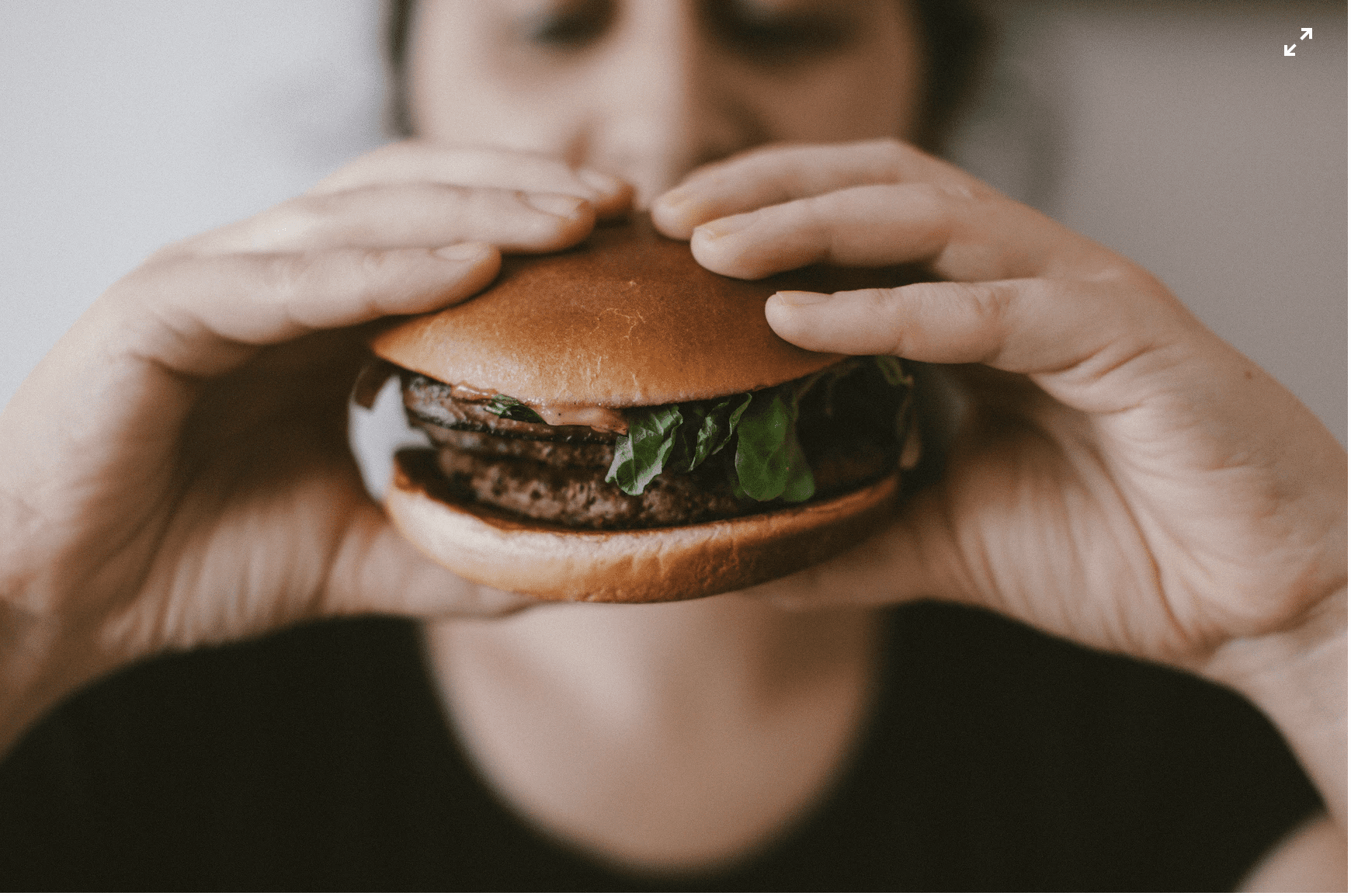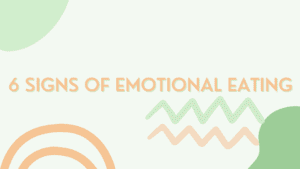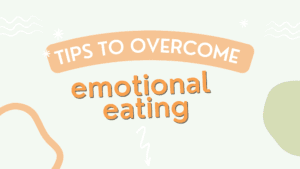What is emotional eating?
Have you ever found yourself reaching for some biscuits when you’re stressed at work? Or snacking on ice cream after a break up? Maybe you reward yourself for finishing a project with some cake? Or mindlessly munch on crisps when you’re bored? If you answer yes to any of these questions then you’re not alone. Emotional eating is very common and most of us probably do it sometimes. The main purpose of food is to fuel our bodies. However, for many people emotions also play a strong role in what we eat.
The occasional reward or distraction with food isn’t likely to be cause for concern. However frequent emotional eating can lead to overeating, unhealthy eating and weight gain. Emotional eating tends to happen at a time when we’re not hungry. We usually choose high sugar or carbohydrate heavy foods (junk food, sweet food and so on) to eat. An infrequent emotional snack may not be an issue but it could become more of a problem if it happens more often.
Signs that you might be eating emotionally
You’re eating when you have certain feelings
Feeling hungry isn’t typically affected by something like a bad day at work or falling out with a friend. If you notice yourself wanting to eat at these times then it may be that you’re eating emotionally. Feelings that can lead us to eat emotionally include stress, sadness, anger, loneliness and boredom. Even positive feelings like happiness may trigger us to eat emotionally, for instance as a reward or at a celebration.
The urge to eat seems to come out of the blue
Real hunger will increase gradually over time. If you notice a sudden urge to eat that seems to come from nowhere then this is likely to be due to emotional eating.
You only crave one type of food
When we’re hungry although we might have a preference for a food, such as pasta, we recognise that other meals would work too. With emotional eating we tend to focus just one one food type like chocolate. The craving can remain until we’ve eaten it.
Food makes you feel safe
If you feel that food is your friend or your safe place then it may be that you’re emotionally eating. When food becomes our way of coping with life it’s likely that we’re eating at times when we’re not really hungry.
Emotional hunger isn’t a physical feeling
We might know we’re physically hungry due to a rumbling stomach. Emotional eating is more of a craving in our minds. If you notice yourself wanting to eat but you don’t have any of the physical signs of being hungry it might help to ask yourself if you’re emotionally eating.
Emotional eating doesn’t stop when we’re full
When we’re eating emotionally we tend to want more and more and it’s hard to feel satisfied. If our eating is due to physical hunger then we’re usually happy to stop eating once we feel full.
Underlying causes of emotional eating
1. Eating our emotions
Sometimes we use food as a way to avoid our difficult emotions. Eating can feel like a way to escape confronting our sadness, boredom, anxiety or loneliness. However, emotional eating can also create difficult emotions such as guilt or shame.
2. Stress
When we’re stressed our bodies produce the stress hormone cortisol. Increased cortisol leads to cravings for unhealthy foods that give us a temporary burst of energy. The more chronic or uncontrolled stress we have in our lives, the more likely we are to emotionally eat.
3. Childhood patterns
We often repeat what we learnt in our childhoods. If we had parents who used food as a reward then we may do the same for ourselves now. Likewise, if our parents handled their own emotions by emotional eating then we may find we follow in their footsteps in our adult lives too.
The difference between emotional eating and a binge eating disorder
A binge eating disorder is the feeling of being compelled to overeat on a regular basis. There are often underlying emotional reasons for this overeating too. However, most people who eat emotionally don’t have an eating disorder. Many people have comfort foods they turn to sometimes. It’s also common to overeat sometimes, such as at celebrations.
The key is to consider how often you find yourself emotional eating and how in control of that eating you feel. If you notice you’re emotional eating from time to time but you can stop yourself if you want to then it’s unlikely that you have a binge eating disorder. When the eating is more frequent and out of control then it’s possible it could be a binge eating disorder. If you have any doubt at all reach out to a medical professional.
Tips to overcome emotional eating
Keep a food journal
Keeping a journal about our emotional eating can help us to keep track of the connection between our mood and our food intake. When you eat emotionally or you notice the urge to do so try to pause and note down how you were feeling, or anything that had just happened. For example, were you feeling bored, or had you just had a difficult conversation with a friend? Make a note of how you felt when you were eating, and how you felt afterwards too.
Over time you may find that you’re able to identify a pattern. For example, you may tend to eat when you’re feeling lonely or after an argument with your partner. Once you’ve identified this pattern you can be on the lookout for emotional eating at these times and experiment with using different coping strategies instead.
Explore other ways to manage your feelings
Although it’s common to try to manage our emotions with emotional eating, there are many other more helpful and healthier ways to deal with how we feel. Developing a regular practice of looking after ourselves can help. Strategies such as daily journaling, exercise, time in nature, meditation or time with friends and family are useful. Hobbies and interests also help us to better manage our feelings.
When you notice yourself feeling a difficult emotion, pause and try to identify what that feeling might be. For instance, are you feeling low or exhausted? Once you have a sense of what you’re feeling, are there alternatives to eating that you can use to support yourself with that emotion? For instance, if you’re feeling down then could you call a friend or do some exercise (physical activity is good for improving our mood)? Or if you’re exhausted can you allow yourself to rest, perhaps by having a bath or reading a book?
Mindful eating
Emotional eating tends to be done quickly, without thinking. It often happens whilst we’re doing something else such as watching TV. We can become more aware of our eating by slowing down, savouring the taste and texture of our food and focusing only on eating. Taking time to chew our food, taking breaths in between bites and noticing how the food makes us feel can be good for our physical and our mental health and can help us reduce emotional eating.
Talk with someone about how you feel
We can often feel guilty or shameful for emotional eating. These negative feelings can create a vicious cycle where we emotionally eat because we feel bad, we then feel bad about emotionally eating, and so we’re more likely to emotionally eat in the future too. Talking to someone we trust about our emotional eating can help to remove the guilt and shame and break the cycle of emotional eating. You may find that they also emotionally eat sometimes. Perhaps you can work with them to support each other in developing healthier coping mechanisms.
How can Online-Therapy.com help?
If you’ve tried these ideas and you’re still finding emotional eating a challenge then Online-Therapy.com can help! By signing up to our program you will choose a therapist who will work with you to explore your emotional eating in more depth and help you find solutions. You might look into the causes of your emotional eating and strategies to help you manage your emotions differently to overcome it.
At Online-Therapy.com we offer an integrated and holistic package to support your well-being. Our approach includes regular sessions with your chosen therapist, unlimited messaging and worksheet support, journaling and yoga. This ongoing support means that you have the daily expert guidance you need to make progress and overcome emotional eating for good.






Leave A Comment